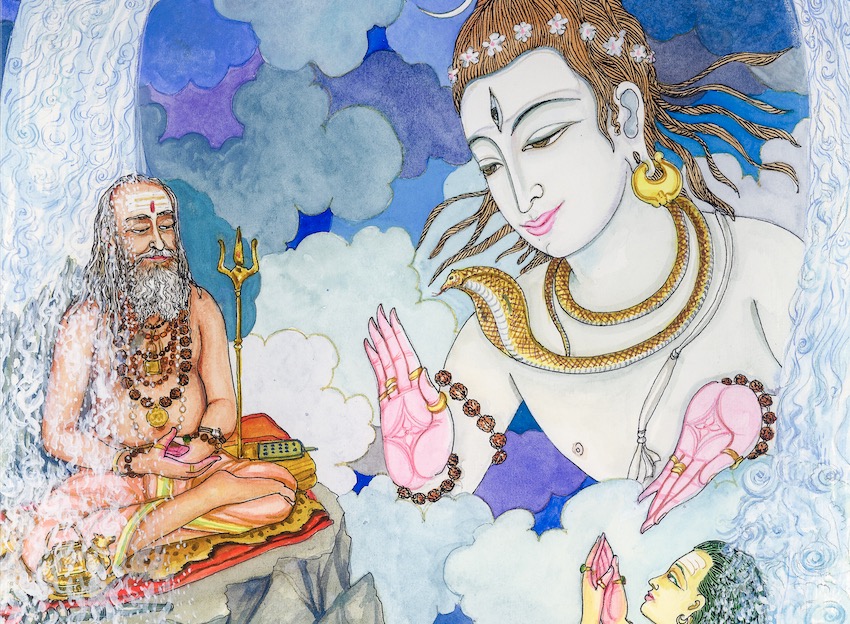An ongoing dialogue between Lord Siva and Sage Matanga
The following is a free translation of the Matanga Agama, section 6 of 19, part of an ongoing conversation between Sage Matanga and Lord Siva. In this section Matanga asks about knowledge itself and the argument that it cannot be cognized.
THE EXTENT TO WHICH A SOUL CAN OBTAIN RIGHT KNOWLEDGE about God (who is intent on cosmic activity that is governed by a supply of power or sakti)and right knowledge about bound souls and the stockpile of their bonds is yet to be settled. These bound souls, the Lord who puts them under bondage and the bonds themselves are three realities which exist simultaneously. But it is said that knowledge of these three realities should be ascertained through sadhana and logical reflection. Their nature should be fully understood as they are. This accurate knowledge, accumulated through sadhana and reflection, should then be imparted to others. In this way, sage Matanga, being keen on gaining this knowledge, approached Lord Siva.
The Lord responded to the great-souled Matanga: “What has been termed pasu (the bound soul) is also referred to as kshetri (embodied), kshetrajna (knower of the nature of embodiment), sariri (possessor of body), ruddhatma (the self whose essential power is arrested) and bhokta (enjoyer).”
Matanga then commented: “Some venerable thinkers assert that the knowledge gained by the organs (indriyas) is in continuous flow, like the water in a river. Being momentary, the knowledge dies, giving rise to more knowledge, like one wave of a river giving way to the next. Such cessation of one knowledge and emergence of another is happening continuously. They say such knowledge does not exist in the soul—that knowledge itself is the soul. Apart from that knowledge, which ends in void, there is no soul. O, Lord, how could it be ascertained through the process of logical reasoning that apart from that knowledge there actually is a soul whose existence is eternal?”
The Supreme Lord answers: “The void at which your knowledge supposedly terminates never occurs. There is no valid proof for the presence of such void, and knowledge of an existence is not gained without proof. It is known clearly through logical reasoning. But, through the same logical reasoning, the absolute absence of an existence (sunya) cannot be established, since such a void is non-existent and cannot be perceived. Just as the presence of a cloth cannot be known in a lump of clay through valid reasoning, even so the presence of a void could not be known in an ever-existing object. The capability to cognize God, bonds and karma is never obstructed, since it is eternal; not momentary, as you have proposed, Matanga.
Lord Siva offered further, “If right knowledge of God, the soul’s bonds and the soul’s accrued karmic history—which has ceased to exist—is effervescent and cognition of it dies with it, how could a person ever cognize that knowledge? Only because of the continuous existence of that knowledge is one able to recollect the past. From one moment to the next moment, the knowledge continues to exist, and along with it cognition of the bonds also continues to exist. Such eternal knowledge is with the soul from the time of birth up to the time of death, and destruction of it never occurs. In spite of this, it is a great wonder that the destruction of such knowledge is observed by you in all situations.
“If these three forms of knowledge are momentary, and if one knowledge dies giving rise to another, is there a lapse of time between the cessation of previous knowledge and the emergence of another? Or is it constant, free from the lapse of time? If there is a lapse of time, then there must be discontinuity in the knowledge-stream. In the latter case, there could be no cognition of the objects already known before, since cognition would also have died. As such, the yogins of your system could never attain liberation, since they could not accrue knowledge of the disciplines laid down for the fulfillment of yoga. Because of the proposed break in knowledge, a person could not know the ordained disciplines.
“However, if there is no lapse of time between the cessation and the emergence and it is without interruption, then it becomes clear that the knowledge is not momentary but only eternal.”
DR. S. P. SABHARATHNAM SIVACHARYAR, of the Adi Saiva priest lineage, is an expert in ancient Tamil and Sanskrit, specializing in the Vedas, Agamas and Shilpa Shastras. This excerpt is from his recent translation of the Matanga Agama.


